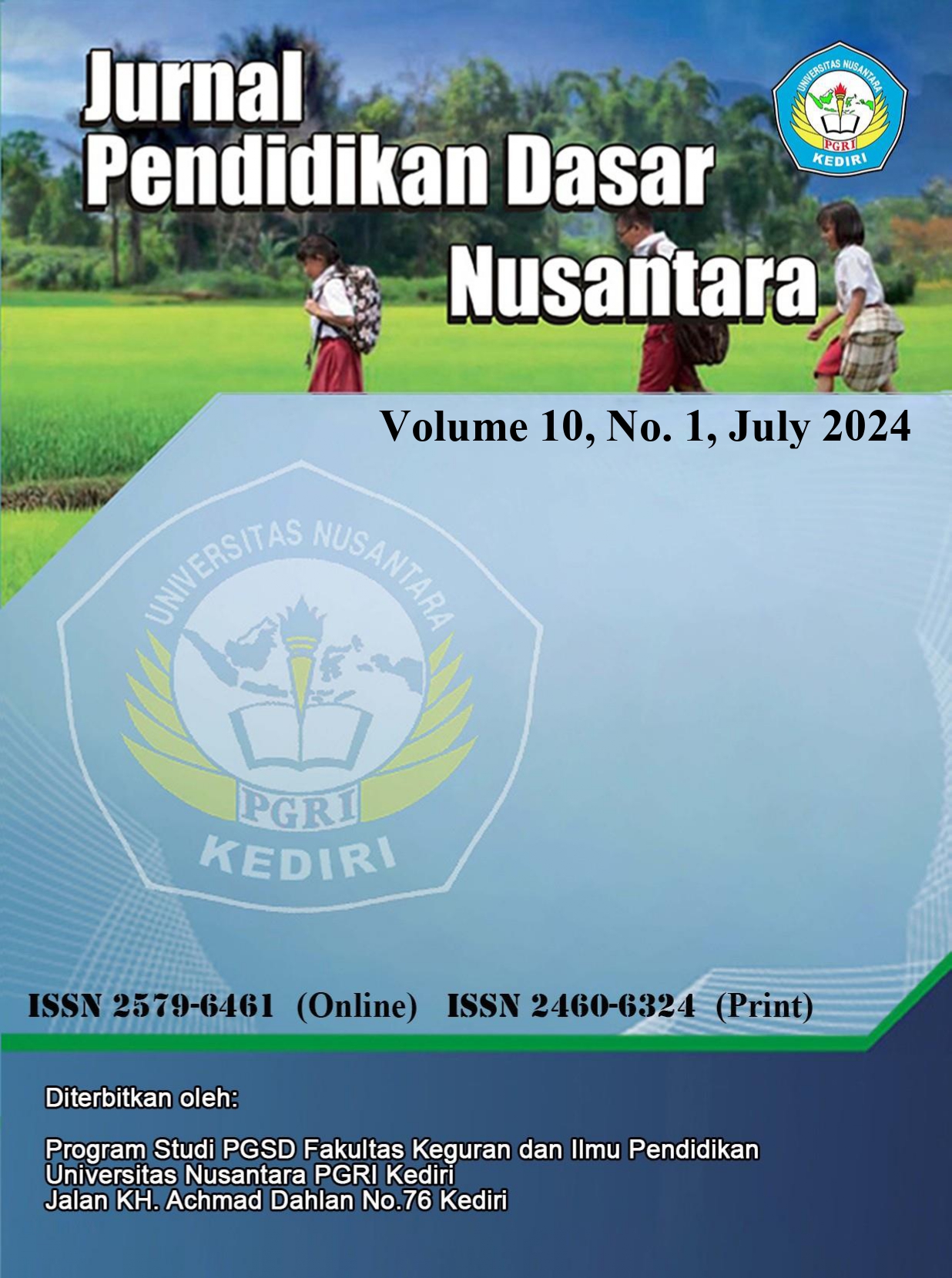The Relationship of Emotional Intelligence of Fifth Grade Students to Bullying Behavior in Elementary Schools
DOI:
https://doi.org/10.29407/jpdn.v10i1.22749Keywords:
Bullying, emotional intelligence, elementary schoolsAbstract
Education in Indonesia is experiencing a bullying emergency. Bullying is aggressive behavior that involves an imbalance of power followed by oppression and solely to make others feel uncomfortable or afraid. Bullying cases in educational institutions, especially in elementary schools, are increasing every year. This is caused by various factors, including external and internal factors. External factors include parenting patterns, the environment, and culture from outside. While internal factors come from within the students, including feelings of empathy and student personality related to emotional intelligence. Therefore, this study aims to determine the relationship between emotional intelligence and bullying behavior in elementary schools. The population in this study was grade V at SDN 12 Pagi Cengkareng Timur with a sample of 30 students. Sampling in this study was determined using a purposive sampling technique because it met certain criteria, such as sample homogeneity which was in the age range of 11-12 years, a sample size sufficient to achieve the desired depth of analysis, and ease of access to members of the population. This study is a quantitative study with a data collection technique using a questionnaire instrument that goes through a statistical test stage, such as validity and reliability tests. This study uses two analysis techniques, namely univariate analysis and bivariate analysis. The results of the correlation test show that the Sig. value is 0.019 <0.05 with r count 0.426> r table 0.361, so there is a positive and significant relationship between emotional intelligence and bullying behavior. The higher the level of emotional intelligence of a student, the lower the tendency of bullying behavior.
Downloads
References
Anisah, A. S., Hakam, K. A., & Syaodih, E. (2021). Perkembangan Sosial, Emosi, Moral Anak Dan Implikasinya Terhadap Pembentukan Sikap Sosial Siswa Sekolah Dasar. JUDIKDAS: Jurnal Ilmu Pendidikan Dasar Indonesia, 1(1), 69-80.
Bariyyah, K., & Latifah, L. (2019). Kecerdasan Emosi Siswa Ditinjau dari Jenis Kelamin dan Jenjang Kelas. JPGI: Jurnal Penelitian Guru Indonesia, 4(2), 68.
Dewi, P. Y. A. (2020). Perilaku School Bullying Pada Siswa Sekolah Dasar. Edukasi: Jurnal Pendidikan Dasar, 1(1), 39-48.
Goleman, D. (2000). Emotional Intelligence: Why It Can Matter More Than IQ. Bantam Books.
Hafidurrahman, M., & Dannur, M. (2023). Strengthening Students' Self-Control Through Islamic Religious Education Learning In Preventing Bullying. Al-Riwayah: Jurnal Kependidikan, 15(2), 316-329
Jempru, M. S., & Trihastuti, M. C. W. (2023). Studi Kasus Kecerdasan Emosional Siswa Korban Bullying. Psiko Edukasi, 21(2), 123-140.
Katadata. (2024, Februari 20). Ada 30 kasus bullying sepanjang 2023, mayoritas terjadi di SMP. Databoks Katadata. Diakses pada 23 Mei 2024, dari https://databoks.katadata.co.id/datapublish/2024/02/20/ada-30-kasus-bullying-sepanjang-2023-mayoritas-terjadi-di-smp
Khaulani, F., Neviyarni, S., & Irdamurni, I. (2020). Fase dan tugas perkembangan anak Sekolah Dasar. Jurnal Ilmiah Pendidikan Dasar, 7(1), 51-59.
Komisi Perlindungan Anak Indonesia. (2020, Februari 10). Sejumlah kasus bullying sudah warnai catatan masalah anak di awal 2020, begini kata komisioner KPAI. KPAI. Diakses pada 23 Mei 2024, dari https://www.kpai.go.id/publikasi/sejumlah-kasus-bullying-sudah-warnai-catatan-masalah-anak-di-awal-2020-begini-kata-komisioner-kpai
Malida, D., Suryati, S., & Kusumasari, R. V. (2021). Hubungan Kecerdasan Emosional dengan Perilaku Bullying Pada Siswa Kelas V SD Negeri 1 Jambidan Yogyakarta. Jurnal Kesehatan Karya Husada, 9(1), 1-10.
Maramis, S. (2022). Hubungan Antara Pola Asuh Authoritarian Dengan Perilaku Bullying Pada Siswa Sekolah Dasar Islam Terpadu Di Kecamatan Junjung Sirih Sumatera Barat (Doctoral dissertation, Universitas Islam Negeri Sultan Syarif Kasim Riau)
Marsari, H., Neviyarni, N., & Irdamurni, I. (2021). Perkembangan emosi anak usia sekolah dasar. Jurnal Pendidikan Tambusai, 5(1), 1816-1822.
Marsela, M. (2024). Dampak Verbal Bullying Terhadap Kepercayaan Diri Siswa SD Negeri 010 Bukit Kauman Kecamatan Kuantan Mudik. Jurnal Penelitian Ilmu Pendidikan Indonesia, 3(2), 223-230.
Masyithoh, S. (2023). Studi Literatur: Hubungan antara Kecerdasan Emosional dan Perilaku Bullying. Elementar: Jurnal Pendidikan Dasar, 3(1), 57-67.
Nadia, D. O., & Suhaili, N. (2023). Peran Interaksi Sosial dalam Perkembangan Emosional Anak Sekolah Dasar. Pendas: Jurnal Ilmiah Pendidikan Dasar, 8(1), 2727-2738.
Nasihah, D. (2021). Hubungan Verbal Bullying dengan Kecerdasan Emosional Anak di Sekolah Dasar Negeri Siranggap Cigudeg Bogor Barat. INSTRUKTUR: Jurnal Pendidikan Guru Madrasah Ibtidaiyah, 1(1), 21-28.
Octavia, D., Puspita, M., & Yan, L. S. (2020). Fenomena perilaku bullying pada anak di tingkat Sekolah Dasar. Riset Informasi Kesehatan, 9(1), 43-50.
Pemerintah Indonesia. Undang-undang Nomor 20 Tahun 2003. Sistem Pendidikan Nasional. Perpustakaan Nasional. Jakarta.
Rahayu, B. A., & Permana, I. (2019). Bullying di sekolah: Kurangnya empati pelaku bullying dan pencegahan. Jurnal Keperawatan Jiwa, 7(3), 237-246
Rahmawati, S. (2021). Perkembangan Kecerdasan Emosional di Era Digital (Studi Kasus Anak Usia Sekolah Dasar Pengguna Gadget di Bantul). G-Couns: Jurnal Bimbingan dan Konseling, 6(1), 102-109.
Ramadhanti, R., & Hidayat, M. T. (2022). Strategi guru dalam mengatasi perilaku bullying siswa di sekolah dasar. Jurnal Basicedu, 6(3), 4566-4573.
Sugiyono. (2022). Metode Penelitian Kuantitatif, Kualitatif, dan R&D. Alfabeta. Bandung
Wijaya, B., & Khusnal, E. (2019). Kecerdasan Emosional dan Sikap terhadap Bullying pada Anak Usia Sekolah. JHes (Journal of Health Studies), 3(2), 28-39.
Wijayanti, M., & Hidayat, S. (2022). Pedadidaktika: Jurnal Ilmiah Pendidikan Guru Sekolah Dasar Karakteristik Pendidik dalam Isu Bullying di Sekolah Dasar. All rights reserved, 9(3).
Downloads
Published
Issue
Section
License
Authors who publish with this journal agree to the following terms:
- Copyright on any article is retained by the author(s).
- The author grants the journal, the right of first publication with the work simultaneously licensed under a Creative Commons Attribution License that allows others to share the work with an acknowledgment of the work’s authorship and initial publication in this journal.
- Authors are able to enter into separate, additional contractual arrangements for the non-exclusive distribution of the journal’s published version of the work (e.g., post it to an institutional repository or publish it in a book), with an acknowledgment of its initial publication in this journal.
- Authors are permitted and encouraged to post their work online (e.g., in institutional repositories or on their website) prior to and during the submission process, as it can lead to productive exchanges, as well as earlier and greater citation of published work.
- The article and any associated published material is distributed under the Creative Commons Attribution-ShareAlike 4.0 International License

































